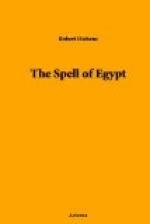I ascended the steps, passed through a doorway, and found myself on a piece of waste ground, flanked on the right by an old, mysterious wall, and on the left by the long wall of the mosque, from which close to me rose a grey, unornamented minaret, full of the plain dignity of unpretending age. Upon its summit was perched a large and weary-looking bird with draggled feathers, which remained so still that it seemed to be a sad ornament set there above the city, and watching it for ever with eyes that could not see. At right angles, touching the mosque, was such a house as one can see only in the East—fantastically old, fantastically decayed, bleared, discolored, filthy, melancholy, showing hideous windows, like windows in the slum of a town set above coal-pits in a colliery district, a degraded house, and yet a house which roused the imagination and drove it to its work. In this building once dwelt the High Priest of the mosque. This dwelling, the ancient wall, the grey minaret with its motionless bird, the lamentable waste ground at my feet, prepared me rightly to appreciate the bit of old Cairo I had come to see.
People who are bored by Gothic churches would not love the mosque of Ibn-Tulun. No longer is it used for worship. It contains no praying life. Abandoned, bare, and devoid of all lovely ornament, it stands like some hoary patriarch, naked and calm, waiting its destined end without impatience and without fear. It is a fatalistic mosque, and is impressive, like a fatalistic man. The great court of it, three hundred feet square, with pointed arches supported by piers, double, and on the side looking toward Mecca quintuple arcades, has a great dignity of sombre simplicity. Not grace, not a light elegance of soaring beauty, but massiveness and heavy strength are distinguishing features of this mosque. Even the octagonal basin and its protecting cupola that stands in the middle of the court lack the charm that belongs to so many of the fountains of Cairo. There are two minarets, the minaret of the bird, and a larger one, approached by a big stairway up which, so my dragoman told me, a Sultan whose name I have forgotten loved to ride his favorite horse. Upon the summit of this minaret I stood for a long time, looking down over the city.
Grey it was that morning, almost as London is grey; but the sounds that came up softly to my ears out of the mist were not the sounds of London. Those many minarets, almost like columns of fog rising above the cupolas, spoke to me of the East even upon this sad and sunless morning. Once from where I was standing at the time appointed went forth the call to prayer, and in the barren court beneath me there were crowds of ardent worshippers. Stern men paced upon the huge terrace just at my feet fingering their heads, and under that heavy cupola were made the long ablutions of the faithful. But now no man comes to this old place, no murmur to God disturbs the heavy silence. And the silence, and the emptiness,




